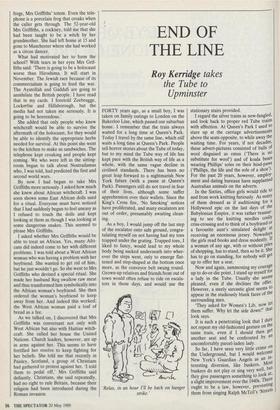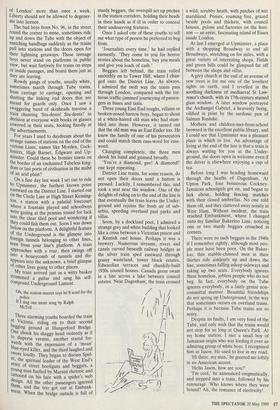END OF THE LINE
Roy Kerridge takes
the Tube to Upminster
FORTY years ago, as a small boy, I was taken on family outings to London on the Bakerloo Line, which passed our suburban home. I remember that the train always waited for a long time at Queen's Park. Today I travel by the same line, which still waits a long time at Queen's Park. People tell horror stories about the Tube of today, but to my mind the Tube way of life has kept pace with the British way of life as a whole, with the same vague decline in civilised standards. There has been no great leap forward to a nightmarish New York future (with a pause at Queen's Park). Passengers still do not travel in fear of their lives, although some suffer apprehension over their wallets. Since the King's Cross fire, 'No Smoking' notices have proliferated, and many escalators are out of order, presumably awaiting clean- ing.
As a boy, I would jump off the last step of the escalator onto safe ground, congra- tulating myself on not having had my toes trapped under the grating. Trapped toes, I liked to fancy, would lead to my whole body being sucked underneath into wher- ever the steps went, only to emerge flat- tened and step-shaped at the bottom once more, as the conveyor belt swung round. Grown-up relatives and friends from out of town would often refuse to ride on escala- tors in those days, and would use the
'Relax, in an hour I'll be back on hunger strike.' stationary stairs provided.
I regard the silver trains as newfangled and look back to proper red Tube trains with affection. At Queen's Park I used to stare up at the carriage advertisements above the seats opposite, to while away the waiting time. For years, if not decades, these advert-pictures consisted of balls of wool disguised as emus (`There is no substitute for wool') and of koala bears wearing Phillips' soles on their hind-paws (Phillips, the life and the sole of a shoe). For the past 20 years, however, employ- ment and dating bureaux have supplanted Australian animals on the adverts.
In the Sixties, office girls would ride to and from work knitting furiously. As many of them dressed as if auditioning for a Hollywood epic on the last days of the Babylonian Empire, it was rather reassur- ing to see the knitting needles cosily criss-crossing and to think of a boyfriend or a favourite aunt's simulated delight at receiving an enormous jersey. Nowadays the girls read books and dress modestly. If a woman of any age, with or without piles of shopping, has to stand, then so be it. She has to go on standing, for nobody will get up to offer her a seat. Now and again, summoning my courage up to do-or-die point, I stand up myself for a lady in the Tube. Usually she seems pleased, even if she declines the offer. However, a steely sarcastic glint seems r° appear in the studiously blank faces of the surrounding men. 'They asked for Women's Lib, now let them suffer. Why let the side down?' that look says. It is such a penetrating look that I dare not repeat my old-fashioned gesture on the same train, even if I should then get another seat and be confronted by an uncomfortably parcel-laden lady. So far, I have seen very little crime on the Underground, but I would welcome New York's Guardian Angels as an in- teresting diversion, like buskers. Most buskers do not play or sing very well, but they give passengers something to look at, a slight improvement over the 1940s. The ought to be a law, however, preventing them from singing Ralph McTell's 'Streets
of London' more than once a week. Liberty should not be allowed to degener- ate into licence.
The bad boys from No. 96, in the street round the corner to mine, sometimes ride up and down the Tube with the object of snatching handbags suddenly as the trains pull into stations and the doors open for their lightning getaways. These teenage boys never stand on platforms in public view, but wait furtively for trains on steps or inside passages, and board them just as they are leaving. Rowdy gangs of youths, usually white, sometimes march through Tube trains, from carriage to carriage, opening and shutting the linking end doors that are meant for guards only. Once I saw a swaggering band of skinheads traverse a train chanting 'Stu-dents! Stu-dents!' in derision at everyone with books or glasses Cowered in their seats, looking fixedly at the advertisements.
For years I used to daydream about the strange names of stations on the end of the various Lines, names like Morden, Cock- fosters, High Barnet, Edgware and Up- minster. Could these be frontier towns on the border of an enchanted Tubeless king- dom or last ports of civilisation in the midst of an arid plain?
On a fine day last week I set out to ride to Upminster, the furthest known point eastward on the District Line. I started out on the Circle Line at High Street Kensing- ton, a station with a palatial forecourt where a fountain played and schoolboys were gazing at the pennies tossed for luck into the clear tiled pool and wondering if they could fish them out. Soon I was down below on the platform. A delightful feature of the Underground is the glimpse into foreign tunnels belonging to other lines, seen from your line's platform. A train aPproaches with a roar, then swings off into a honeycomb of tunnels and dis- appears into the unknown, a brief glimpse of other lives going to other places. My train arrived just as a witty busker strummed a guitar and sang his self- composed Underground Lament.
Oh, the station master says he'll send for the police
If I sing one more song by Ralph
MeTell . .
Three alarming youths boarded the train .at Victoria, riding on to their second begging ground at Hungerford Bridge. One shook his shaggy head violently as if to disperse vermin, another stared for- wards with the expression of a 'mean' blue-eyed killer, and the third laughed and swore loudly. They began to discuss Spid- er, the spiritual leader of the West End's army of street hooligans and beggars, a Young man fuelled by Marxist rhetoric and tattooed on his face with a spider's web ..esign. All the other passengers ignored them, and the trio got out at Embank- ment. When the bridge outside is full of
sturdy beggars, the overspill set up pitches in the station corridors, holding their heads in their hands as if ill in order to conceal their undeserving features.
Once I asked one of these youths to tell me what type of person he preferred to beg from.
'Journalists every time,' he had replied earnestly. 'They come to you for horror stories about the homeless, buy you meals and give you loads of cash.'
Beggars left behind, the train rolled smoothly on to Tower Hill, where I chan- ged onto the District Line. As always, I admired the swift way the trains pass through London, compared with the tor- tuous traffic-jammed journeying of passen- gers in buses and taxis.
Three young East End toughs, villains or broken-nosed barrow boys, began to shout at a white-haired old man who had stum- bled into them. However, it turned out that the old man was an East Ender too. He knew the family of one of his persecutors and could match them cuss-word for cuss- word.
Changing completely, the three men shook his hand and grinned broadly.
'You're a diamond, guy! A diamond!' one kept repeating.
District Line trains, for some reason, do not open their doors until a button is pressed. Luckily, I remembered this, and took a seat near the window. One of the , delights of riding on to the end of the line is that eventually the train leaves the Under- ground and rejoins the fresh air of sub-. urbia, speeding overland past parks and villas.
Soon, by a dockland pool, I admired a strange grey and white building that looked like a cross between a Victorian prison and a Kentish oast house. Perhaps it was a brewery. Numerous streams, rivers and canals curved beneath railway bridges as the silver train sped eastward through grassy wasteland, tower block estates, Edwardian terraces and chunkily-built 1930s council houses. Canada geese swam in a line across a lake between council estates. Near Dagenham, the train crossed a wild, scrubby heath, with patches of wet marshland. Ponies, roaming free, grazed beside pools and thickets, with council houses, pylons and factories on the hori- zon — an eerie, fascinating island of Essex inside London.
At last I emerged at Upminster, a place with a shopping Broadway to end all Broadways, stretching on for miles, with a great variety of interesting shops. Fields and green hills could be glimpsed far off between the shops and villas.
A grey church at the end of an avenue of yew trees is for me one of the loveliest sights on earth, and I revelled in the soothing darkness of mediaeval St Law- rence's church, with its 17th-century stained glass window. A later window portrayed the Archangel Gabriel, a heavenly being, vilified in print by the sardonic pen of Salman Rushdie.
Mothers and children-met-from-school browsed in the excellent public library, and I could see that Upminster was a pleasant place in which to live. An advantage of living at the end of the line is that a train is always waiting for you at the Under- ground, the doors open in welcome even if the driver is elsewhere enjoying a cup of tea.
Before long I was heading homeward through the heaths of Dagenham. At Upton Park, four boisterous Cockney- Jamaican schoolgirls got on, and began to lark . about, holding fencing matches with their closed umbrellas. No one told them off, and they clattered away noisily at West Ham. Without incident, the train reached Embankment, where I changed onto my familiar Bakerloo Line, noticing one or two sturdy beggars crouched in corners.
There were no such beggars in the 1940s if I remember rightly, although most peo- ple must have been poor. On the Baker- loo, thin stubble-chinned men in their thirties ride aimlessly up and down the line, sometimes falling asleep sideways and taking up two seats. Everybody ignores these homeless, jobless people who do not beg. In fact, everybody on the Tube ignores everybody, in a fairly genial non- committal manner. Beautiful friendships do not spring up Underground, in the way that sometimes occurs on overland trains. Perhaps it is because Tube trains are so noisy.
Despite its faults, I am very fond of the Tube, and only wish that the trains would not stop for so long at Queen's Park. At my home station, I met a small boy of Jamaican origin who was lording it over an admiring group of white boys. I recognised him as Jason. He used to live in my road.
'Hi there, my man,' he greeted me loftily in an American accent.
'Hello Jason, how are you?'
'I'm cool,' he announced enigmatically, and stepped into a train, followed by his entourage. Who knows where they were bound? Ah, the romance of electricity!



































































 Previous page
Previous page